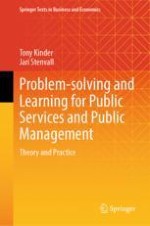2024 | OriginalPaper | Chapter
9. Knowledge Flows and Services Improvements
Authors : Tony Kinder, Jari Stenvall
Published in: Problem-solving and Learning for Public Services and Public Management
Publisher: Springer Nature Switzerland
Activate our intelligent search to find suitable subject content or patents.
Select sections of text to find matching patents with Artificial Intelligence. powered by
Select sections of text to find additional relevant content using AI-assisted search. powered by
